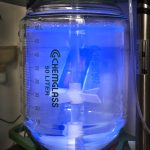dark matter
LUX-ZEPLIN (LZ), a next-generation dark matter detector that will be at least 100 times more sensitive than its predecessor, has cleared another approval milestone and is on schedule to begin its deep-underground hunt for theoretical particles, known as weakly interacting massive particles, in 2020.
From SLAC, June 1, 2016: Fermilab is one of the collaborating groups preparing to build an ultrasensitive ‘eye’ for an elusive form of matter.









